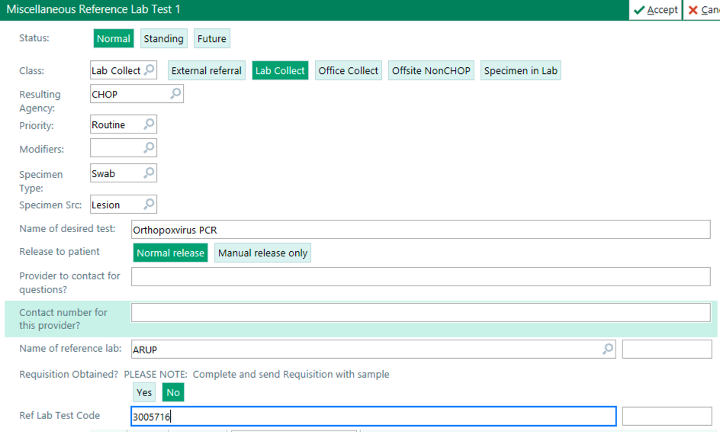Mpox (Monkeypox) Clinical Pathway — Emergency Department, Outpatient Specialty Care and Primary Care
Orthopoxvirus Testing
Preparation and Collection of Specimens for Mpox Testing
If clade I disease is possible, please discuss immediately with IPC on call (via 5-SAFE) the indications for sending specimen directly to the PA State Lab (BOL), which requires a dry swab specimen. This page below describes lab preparation for send outs to ARUP/Labcorp/Quest.
CHOP Lab Mpox Testing
- Place Mpox PCR order for Orthopoxvirus PCR, ARUP test code 99999.080
- For uninsured patients, prior authorization by the health department is required to place an order for this testing.
- See the Online Test Menu for a sample screenshot

© 2024 Epic Systems Corporation
Specimen Collection Guidance for PCR Testing
- Select 2-4 different lesions to swab
- Early lesions may have higher viral loads than older lesions
- It is not necessary to unroof the lesion before swabbing
- Consider collection of scabs if no newer lesions are present
- Use sterile dry polyester, rayon, or Dacron® swab (no calcium alginate or wood)
- Place in viral transport medium (VTM), one swab per container
- If sampling multiple anatomic sites, one swab for each site per container

| Item | Mfr # | Description | UOM | Conv |
|---|---|---|---|---|
| 191185 | GL4692 | Viral Transport Media | EA | 1EA/50BX |
| 191307 | SW0302 | Swab Nares Skin Speci Collect | EA | 1EA/100CS |
| 178256 | DYND30261 | BG Specimen Biohazard 6x9-178256 | PK | 1PK/10CA |
Specimen Transport Conditions
Main Campus Lab
- Submit to central lab within 24 hours of collection (room temperature)
- Specimens can be sent through pneumatic tube system
Ambulatory
- Follow current workflow for specimen send out.
- Labcorp/Quest — specimens will need to go out on ice. Note “refrigerate” on the specimen bag. Put ice pack on sample within the collection box.
- ARUP — specimens may be at room temperature.
Additional Laboratory Testing for Consideration
Consider also testing for other infections such as syphilis (RPR assay), site specific gonorrhea/chlamydia testing (urethral/urine, pharyngeal, and/or rectal), HIV antibody/antigen, and HSV PCR based off symptoms and presentation due to remarkably high rates of STI coinfections.
If < 13 years old or not sexually active, consider testing for VZV, enterovirus.
If concern for bacterial superinfection, collect red-top culture tube for culture and sensitivities.